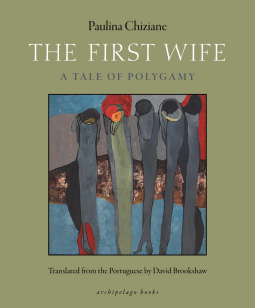
The First Wife
A Tale of Polygamy
by Paulina Chiziane
This title was previously available on NetGalley and is now archived.
Send NetGalley books directly to your Kindle or Kindle app
1
To read on a Kindle or Kindle app, please add kindle@netgalley.com as an approved email address to receive files in your Amazon account. Click here for step-by-step instructions.
2
Also find your Kindle email address within your Amazon account, and enter it here.
Pub Date Aug 09 2016 | Archive Date May 23 2016
Archipelago Books | Archipelago
Description
Advance Praise
"... the narrator expreses the suffering of all women, divided between the desire to live and what appears to be an inner death (...) condemned to lose all her battles and to drift in the shadows." -- Geneviève Vilner, Plural-Pluriel
"... the theme also allows her to lead the reader to discover a country and its customs, and to create some magnificent depictions of women." -- Olivia Marsaud, Afrik.com
"What we have, in Paulina, is the most authentic representation of the problems faced by women in Mozambican society." --Teresa Noronha, Jornal de Notícias
Available Editions
| EDITION | Other Format |
| ISBN | 9780914671480 |
| PRICE | $18.00 (USD) |
Average rating from 19 members
Featured Reviews
This was a very strange book for me to read. First and foremost because I knew it had been originally written in Portuguese and I was reading a translated English version, I kept wondering how the sentences and words would sound in their initial version, so it was difficult for me to disconnect from that. Especially when expressions like little by little the hen fills it's belly (grão a grão enche a galinha o papo) appeared, that is such a Portuguese phrase.
But most of all, I felt so angry throughout the book. At some points I had to close it to be able to breathe again. This made me realize something that I am aware on the back of my mind but it is not present on my daily life. In most of the world women fight a daily battle just to have a dignified existence. And the biggest battle they fight is with each other. We are the first ones to hinder our own progress by adhering to old mentalities, by perpetuating traditions, by educating our daughters differently than we educate our sons. And we are our most aggressive judges. We have a long way to go still towards equality, in being different but with the same rights.
This book was beautifully written. I lost count to the amount of highlights I saved on my kindle to reread later, sentences to keep with me. The language and imagery is very rich and involving. Through one woman’s plight we get to know part of Mozambique’s history, differences between north and south, legacy from colonial times, the struggle between old traditions and the will to be a modern country.
It was my first book by this author, but now I want to get to know more books, preferably in Portuguese.
Recommended to anyone who likes good literature, written with imagination.
Women should be better friends with each other, show more solidarity. We are the majority, we’ve got strength on our side. If we join hands, we can transform the world.
https://peixinhodepratablog.wordpress.com/2016/04/27/historias-de-poligamia/
 Mary M, Reviewer
Mary M, Reviewer
As I contemplated changing my college major (again) to anthropology I read a lot of ethnographies. The First Wife by Paulina Chiziane is a lot like ethnography as it examines the roles of men and women in Mozambique.
However, the First Wife is not Chiziane’s own story but that of Rami, whose marriage is faltering. Her husband, Tony, is running around with other women “stuffing them full of children”. Despite being a Catholic and Christian country, traditional customs still prevail and an informal system of polygamy is still practiced. As she sets out to confront her rivals and rescue her marriage, she becomes aware that her problems and those of Tony’s mistresses are due to the second-class status assigned to women in Mozambique.
The voice in the book is so unique as she manages to balance humor and deep pathos as we follow Rami on her quest for justice so she and other women can be treated equally as human beings. I am so glad I found this book and I will be thinking about it for a long time.
 Rebecca B, Reviewer
Rebecca B, Reviewer
A challenging but nonetheless rewarding read. The First Wife tackles head on the Mozambican tradition of polygamy, exploring its pains as well as rare pleasures through the eyes of Rami as she tries to keep track of her slippery husband Tony. In the process she builds a rambunctious family of wives who give as good as they get, and through whom Rami discovers her own strength. Chiziane fights misogyny in the best way, pointing out its ridiculousness until it reaches the point of farce - although the true sadness is never far from the surface.
 Kel M, Media/Journalist
Kel M, Media/Journalist
In solidarity, power
The First Wife: A Tale of Polygamy by Paulina Chiziane, translated by David Brookshaw (Archipelago Books, $18).
Archipelago Books, a treasured source of international literature in excellent English translations, brings us Paulina Chiziane’s feminist tale of just desserts.
Rami’s been married to her husband, Tony, for twenty years when she finds out she’s been lied to—and she’s not alone. Thus begins The First Wife: A Tale of Polygamy, translated from the Portuguese by David Brookshaw.
Far from being crushed by this betrayal, Rami insists that Tony marry the other women legally, which is allowed in Mozambique. Then the women, once isolated, are able—with Rami at the forefront—to create a community that not only provides some protection from a culture that is abusive to women, but also allows them to grow individually.
Chiziane, the first woman to publish a novel in Mozambique, definitely has an agenda here, but Rami and her sister-wives are so well developed that the political implications of their newfound sisterhood are no bitter pill.
 Mandy J, Reviewer
Mandy J, Reviewer
This is quite a remarkable book, passionate, lyrical, intense and deeply illuminating about Mozambican society and the position of women within it. The very intensity of the prose makes it quite a challenging read, especially as it is also repetitious and unrelenting, but any criticisms I might have of it as a novel are outweighed by its intrinsic worth as a work from an African writer opening up her country to a wider international readership. The plot, such as it is, is essentially a simple one. Rami discovers that her much-loved husband Tony is unfaithful to her. Her approach to this universal situation is a particular one – she forces him to marry his other women. How she gets his other lovers to go along with her, and the reasons she proffers for polygamy, make for some fascinating and thought-provoking reading. Polygamy, post-colonial society, prejudice within Mozambican society, the position of women, tradition versus modernity, sexual practices within the society and the legacy of Christianity – all these are explored as the novel progresses. Paulina Chiziane is the first woman from Mozambique to be published (an interesting fact in itself) and is considered one of the country's most important writers. Little known in the West, this novel will no doubt bring her to a much wider readership, certainly something she deserves, and if at times this particular novel is heavy going, it’s worth sticking with for the insight into Mozambique that it gives.


















